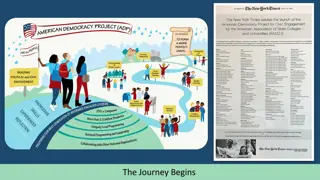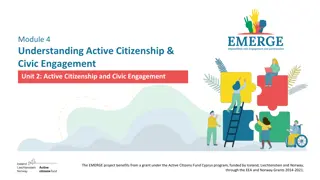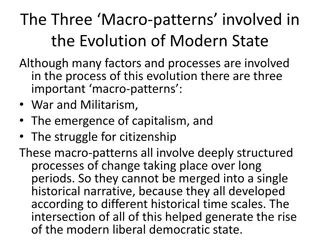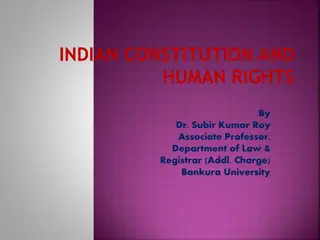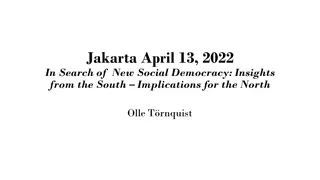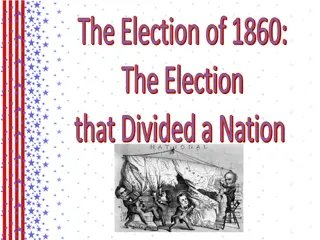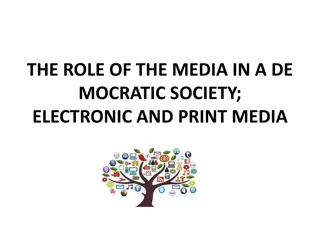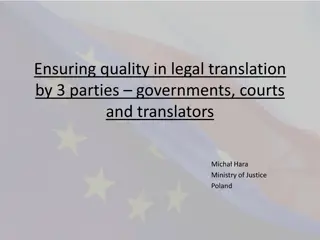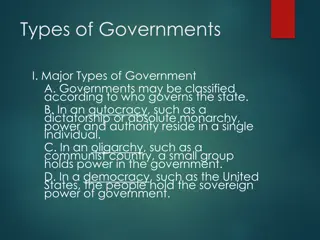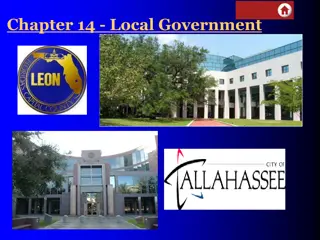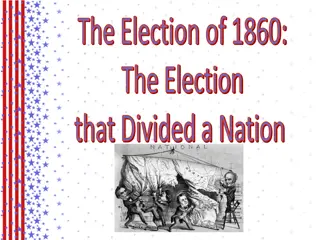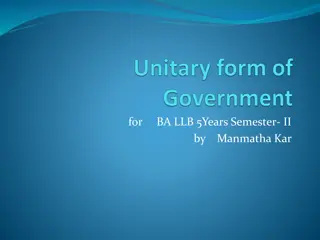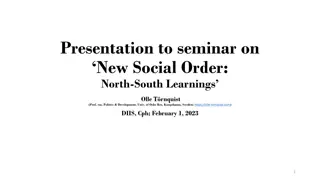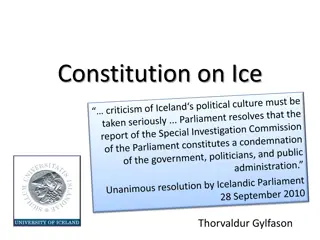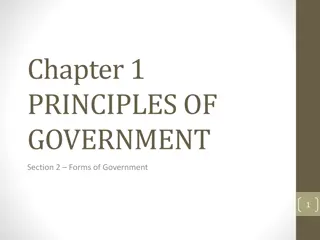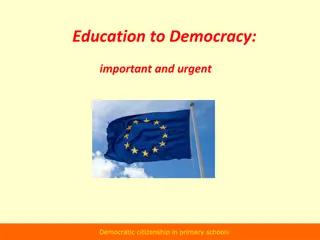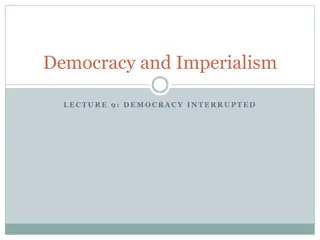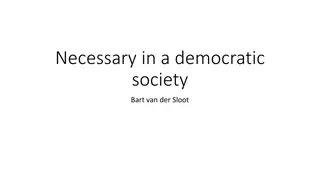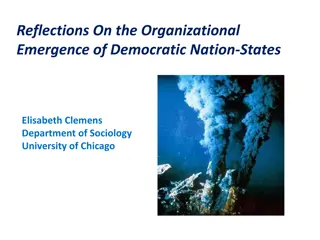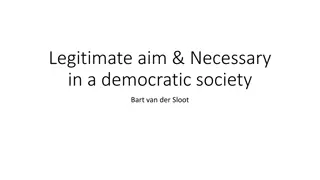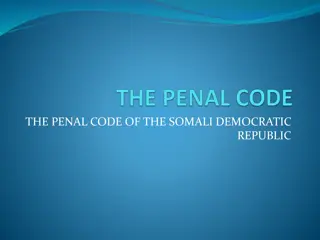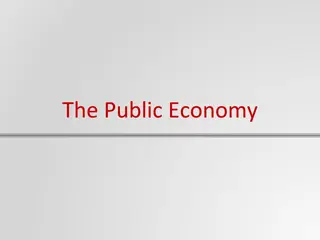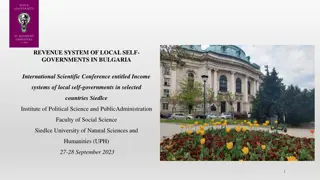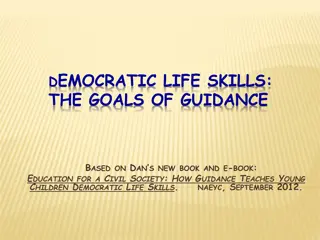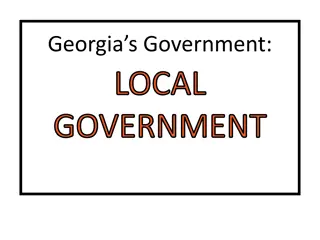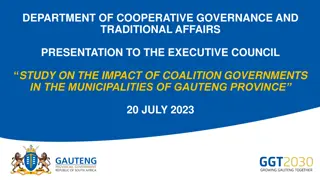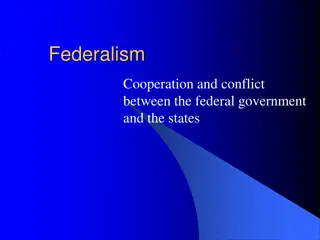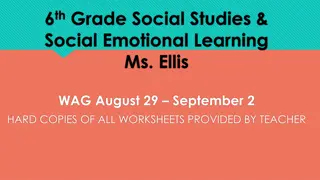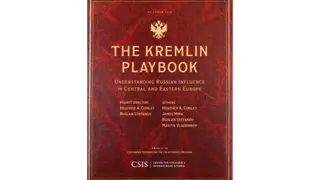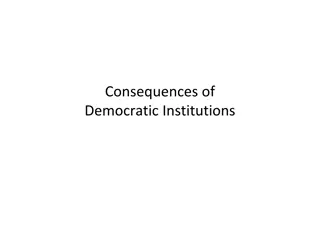The Journey Begins
Initiatives like Voter Education, Deliberative Dialogue, and addressing Global Challenges are pivotal in fostering civic engagement and informed citizenship. The Theory of Change underscores the importance of integral, relational, organic, and generative approaches in democratic engagement efforts,
0 views • 16 slides
Democracy in the EU and Upcoming European Elections Overview
Explore key findings on the state of democracy in the EU, upcoming European elections, and global trends. Europe remains a high-performing region, with Central Europe showing notable democratic growth. Discover how the EU acts as a countervailing institution and challenges faced by strong democracie
0 views • 15 slides
Understanding Active Citizenship & Civic Engagement: Definitions and Importance
Encouraging citizens and organizations to actively participate in civil society and decision-making processes is vital for a democratic society. Active citizenship involves participation in public affairs, civil society, and political life with a focus on human rights, democracy, and community well-
1 views • 22 slides
Evolution of Modern State: Three Macro-Patterns Explored
The evolution of the modern state is influenced by three key macro-patterns: War and Militarism, Emergence of Capitalism, and Struggle for Citizenship. These patterns involve deep processes of change over long periods, contributing to the development of modern liberal democratic states. War and Mili
0 views • 13 slides
Indian Constitution and Human Rights: A Comprehensive Overview
The Indian constitution embodies justice in social, economic, and political spheres, aiming for the full development of every individual. Rooted in democratic principles and socialism, the preamble emphasizes liberty, equality, and justice. Drawing wisdom from leaders like Dr. Ambedkar and Mahatma G
0 views • 10 slides
Insights into the Evolution of Social Democracy in the Global Context
Exploring the challenges and transitions in social democracy from both Northern and Southern perspectives, this research delves into the complexities of needs-driven development based on social justice through democratic means. The author reflects on the decline of social democratic movements and pr
0 views • 15 slides
The Election of 1860: A Divisive Campaign for the Future of the United States
The 1860 election was a significant moment in American history, marked by ideological divisions and the rise of Abraham Lincoln. The Republican Party, Southern Democratic Party, Democratic Party, Northern Democratic Party, and Constitutional Union all played crucial roles in shaping the outcome. The
1 views • 14 slides
The Role of Media in a Democratic Society: Electronic and Print Media Overview
Media plays a crucial role in a democratic society by informing, entertaining, and educating the public. Both electronic and print media provide news, entertainment, and valuable information to society, highlighting events, promoting open debate, exposing violations, and shaping public opinion. The
3 views • 19 slides
Ensuring Quality in Legal Translation by 3 Parties: Governments, Courts, and Translators
Explore the importance of quality legal translation involving governments, courts, and translators in criminal proceedings. The European Union's Directive on interpretation and translation aims to facilitate communication across Member States. Governments play a key role in regulating the translatio
0 views • 20 slides
Cooperative Ownership and Democratic Participation in Economic Models
Explore the principles of cooperative ownership, democratic participation, and economic models as advocated by Jessica Gordon-Nembhard. She emphasizes the historical significance of collective work, indigenous cooperative efforts, and the values of shared risk and surplus sharing in community-owned
0 views • 71 slides
Understanding Types of Governments and Democracies
Explore the major types of governments including autocracy, oligarchy, and democracy. Learn about direct and indirect democracies, as well as the characteristics and soil that nurture democracy. Discover how government functions in various societal structures and the importance of citizen participat
0 views • 4 slides
Insights into Voting Systems and Arrow's Impossibility Theorem
The content delves into various voting systems, including the conditions necessary for a voting system to be fair and democratic. It discusses the challenges faced by democratic voting systems, such as Arrow's Impossibility Theorem, which states that no voting system can satisfy all desirable axioms
0 views • 20 slides
Understanding Local Government: Powers, Responsibilities, and Organization
Local governments are established by state governments and provided powers through charters. They deliver essential services like road maintenance, water supply, and waste collection. Municipalities have self-government to serve their citizens. Ordinances, statutes, and acts regulate local laws and
3 views • 17 slides
The Election of 1860: A Historic Moment in American Politics
The election of 1860 was a pivotal moment in American history, marked by the rise of the Republican Party with Abraham Lincoln as its candidate. This election showcased the division in the Democratic Party, leading to the victory of Lincoln despite hostilities between the North and South. The Consti
4 views • 14 slides
Comparison of Unitary and Federal Government Systems
This presentation compares unitary and federal government systems, highlighting differences in the number of governments, constitution type, flexibility, division of powers, supremacy of constitution, judiciary independence, and legislative structure. It explains how unitary governments have a singl
0 views • 7 slides
Social Democratic Politics: Pillars and Strategies for Transformation
Social democratic politics is rooted in democratic collectivities and rights, aiming to reshape capitalism through reform, regulation, and transformative strategies. Olle Törnquist delves into the historical foundations and the need for comprehensive reforms to challenge the dominant logics of capi
3 views • 10 slides
Iceland's Constitutional Journey: From Economic Collapse to Democratic Reform
Iceland faced a unique situation post the 2008 economic collapse, responding with an IMF-supported rescue, financial fraud prosecutions, and a constitutional reform movement. Despite challenges, strong popular support and civic pressure pushed for political accountability and a new constitution, ref
0 views • 15 slides
Understanding Forms of Government Today
Different forms of government exist in the world today, classified based on characteristics like participation, power distribution, and branches of power. Democracies emphasize people's involvement, while dictatorships concentrate power. Governments can be unitary, federal, or confederate, and power
5 views • 17 slides
Importance of Democratic Citizenship Education in Primary Schools
Promoting democratic citizenship education in primary schools is essential for fostering a sense of community, conflict resolution skills, empathy, and embracing diversity among students. The curriculum focuses on themes like group cohesion, conflict resolution, communication, empathy, community par
0 views • 9 slides
Exploring Values Education in Nordic Preschools
This study delves into the perception and handling of values in Nordic preschools, focusing on caring, disciplinary, and democratic values. It aims to uncover whether conflicting or co-existing values prevail within individual preschools and across Nordic countries. Definitions of values, including
0 views • 16 slides
Challenges to Democracy: An Historical Perspective
Explore the historical instances of democracy being interrupted in Ancient Athens, from the Periclean Peloponnesian War to the oligarchic regimes of 411 and 403 BC. Delve into the reasons behind the dissolution of democracy, the responses of Athenians to such interruptions, and the oligarchs' aims t
0 views • 24 slides
Necessity Test in a Democratic Society: Balancing Public vs Private Interests
The necessity test in a democratic society involves balancing public interests such as security, morality, and environment against private interests. The test determines whether an infringement is necessary and legitimate, or unnecessary and a violation. Different categories like security-related ca
0 views • 36 slides
Enhancing Democratic Electoral Processes in Africa: Challenges and Solutions
Democratic electoral processes in Africa must strive to be inclusive, transparent, and accountable to promote public confidence. The importance of independent and professional electoral governance institutions is emphasized to address the legitimacy crisis facing elections today. The SADC Secretaria
0 views • 13 slides
Dynamics of Democratic Nation-States and Organizational Change
Insights on the emergence of democratic nation-states, the role of networks in democratic revolutions, challenges in defining democratic governance, and the impact of redundancy on organizational stability and change are explored in this thought-provoking discussion by Elisabeth Clemens.
0 views • 25 slides
Guide to Writing a Resolution for Democratic Improvement
A resolution is a formal request to change constitutions, election rules, policies, or bylaws, considered by the Delegate Assembly as a democratic way to enhance a union. Locals, statewide committees, Board of Directors, and any two or more members can submit resolutions. Resolution writers have the
0 views • 33 slides
Democratic Lawmaking in the EU: Promises and Pitfalls of the Ordinary Legislative Procedure
This presentation explores the evolution and impact of the Ordinary Legislative Procedure (OLP) in the European Union, discussing its democratic innovations and achievements post-Lisbon. Topics covered include the implementation of OLP, its democratic implications, and the use of trilogues as negoti
0 views • 11 slides
Legitimate Aims in a Democratic Society - Exam Preparation Overview
Exam preparation on legitimate aims in a democratic society focusing on Article 8 of the ECHR, including the right to respect private and family life, security concerns, national security, public safety, prevention of disorder or crime, and more. The content covers necessary aspects for understandin
0 views • 70 slides
Women in Politics: Democratic Unionist Party of Northern Ireland
The Democratic Unionist Party (DUP) of Northern Ireland actively encourages women's participation, with over 50% female membership. The party has implemented provisions for gender representation in its internal structures and has seen notable gains in female candidates elected. Efforts are underway
0 views • 11 slides
The Penal Code of the Somali Democratic Republic
The Penal Code of the Somali Democratic Republic comprises three main sections focused on offenses in general, crimes, and contraventions. It specifies that individuals can only be punished for acts explicitly deemed offenses by law and outlines principles governing punishments, jurisdiction, elemen
0 views • 23 slides
Challenges of Democratic Governments in Economic Policy Making
Democratic governments face challenges when enacting economic policies due to the influence of voter participation, special interest politics, and the limitations of majority rule. This presentation explores the complexities of democratic decision-making in economic matters, examining the impact of
0 views • 20 slides
Revenue System of Local Self-Governments in Bulgaria
The revenue system of local self-governments in Bulgaria has evolved since the democratic changes in 1990, focusing on decentralization and fiscal autonomy. Key documents and programs have shaped the revenue mechanisms, allowing municipalities to set local fees, introduce debt financing, and gain ta
0 views • 18 slides
Nurturing Democratic Life Skills in Children: A Guide to Promoting Positive Development
Explore the concept of Democratic Life Skills (dLS) and the essential guidance needed to cultivate these skills in young children. Learn about the educational outcomes for a democratic society and the historical and psychological roots of dLS. Discover how to support children in finding acceptance,
0 views • 14 slides
Overview of Local Governments in Georgia
Explore the structure and functions of local governments in Georgia, including counties and cities. Discover how counties serve as administrative subdivisions and provide essential services, while cities originated as trading hubs and offer unique services beyond county jurisdictions. Learn about th
0 views • 26 slides
Waste to Energy Options for Local Governments
Waste to Energy Options for Local Governments explores various technologies available for local governments to convert waste into energy sources such as biodiesel, green diesel, and ethanol. The presentation covers examples of projects, companies at the forefront, and the benefits including energy i
0 views • 14 slides
Study on the Impact of Coalition Governments in Gauteng Municipalities
The Department of Cooperative Governance and Traditional Affairs conducted a study on the impact of coalition governments in Gauteng municipalities. The study aims to understand the dynamics, challenges, and effects of coalition governments on governance, service delivery, and administration. With t
0 views • 60 slides
Analysis of Democratic Dominance in Presidential Elections and Potential Senate Seat Flips in 2016
Democratic candidates have consistently won Democratic stronghold states in presidential elections since 1992, securing a significant portion of the Electoral College votes. Meanwhile, Republicans face challenges in holding onto Senate seats in states like Illinois, Wisconsin, New Hampshire, Pennsyl
0 views • 8 slides
Understanding Federalism: Cooperation and Conflict Between Governments
Federalism entails the division and sharing of powers between national and state governments, aiming for cooperative problem-solving. James Madison highlighted the need for checks and balances to control government abuse. The Constitution delegates specific powers to the national government while al
0 views • 9 slides
6th Grade Social Studies & Social Emotional Learning Curriculum Overview
The curriculum covers topics such as different forms of government, citizen participation in autocratic and democratic governments, and the comparison of parliamentary and presidential democratic systems in countries like the United Kingdom, Germany, and Russia. Students engage in various activities
0 views • 7 slides
Russian Economic Warfare in Central and Eastern Europe: Challenges and Impacts
Russia employs overt and covert economic warfare tactics in Central and Eastern Europe, including energy blockages and media manipulation. This strategy poses challenges to democratic values and institutions. The study examines the correlation between Russia's economic footprint and democratic stand
0 views • 24 slides
Perspectives on Democratic Institutions: Majoritarian vs. Consensus Vision
Democratic institutions have consequential impacts on political representation, economic policy, ethnic conflict, and democratic survival. Two distinct visions, majoritarian and consensus, shape the distribution of power in governance. The majoritarian vision concentrates power in the hands of the m
0 views • 112 slides
